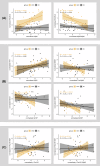Differential neuropsychiatric associations of plasma biomarkers in older adults with major depression and subjective cognitive decline
- PMID: 39152102
- PMCID: PMC11329686
- DOI: 10.1038/s41398-024-03049-w
Differential neuropsychiatric associations of plasma biomarkers in older adults with major depression and subjective cognitive decline
Abstract
Older adults with major depressive disorder (MDD) or early cognitive decline during the subjective cognitive decline (SCD) stage may exhibit neuropsychiatric symptoms such as anxiety, depression, and subtle cognitive impairment. The clinicopathological features and biological mechanisms of MDD differ from those of SCD among older adults; these conditions thus require different treatment strategies. This study enrolled 82 participants above 50 years old with normal cognitive levels from the communities to examine biomarker-behavior correlations between MDD (n = 23) and SCD (n = 23) relative to a normal control (NC) group (n = 36). Multidomain assessments were performed for all participants, including immunomagnetic reduction tests to detect plasma beta-amyloid (Aβ), total tau (Tau), phosphorylated tau-181 (p-Tau181), neurofilament light chain, and glial fibrillary acidic protein (GFAP). This study observed that depressive symptoms in MDD were associated with amyloid pathology (plasma Aβ40 vs. HADS-D: R = 0.45, p = 0.031; Aβ42/Aβ40 vs. HADS-D: R = -0.47, p = 0.024), which was not observed in the NC (group difference p < 0.05). Moreover, cognitive decline in MDD was distinguished by a mixed neurodegenerative process involving amyloid (plasma Aβ42 vs. facial memory test: R = 0.48, p = 0.025), tau (Tau/Aβ42 vs. digit symbol substitution test (DSST): R = -0.53, p = 0.01), and astrocytic injury (plasma GFAP vs. Montreal cognitive assessment score: R = -0.44, p = 0.038; plasma GFAP vs. DSST: R = -0.52, p = 0.014), findings that did not apply to the NC (group difference p < 0.05). Moreover, this study revealed different biomarker-behavior correlations between individuals with SCD and the NC. Compared with the NC, cognitive decline in the SCD group might be unrelated to amyloid pathology and instead might be early manifestations of tau pathology. This study underscores the difference in clinicopathological features between MDD and SCD among older adults, which differ from those of the NC. These findings enhance our understanding of the mechanisms underlying MDD and SCD in older individuals.
© 2024. The Author(s).
Conflict of interest statement
The authors declare no competing interests.
Figures




References
-
- Wei YC, Huang LY, Chen CK, Lin C, Shyu YC, Chen YL, et al. Subjective cognitive decline in the community is affected at multiple aspects of mental health and life quality: a cross-sectional study of the community medicine of Keelung Chang Gung Memorial Hospital. Dement Geriatr Cogn Dis Extra. 2019;9:152–62. 10.1159/000497222 - DOI - PMC - PubMed
MeSH terms
Substances
LinkOut - more resources
Full Text Sources
Medical
Miscellaneous

